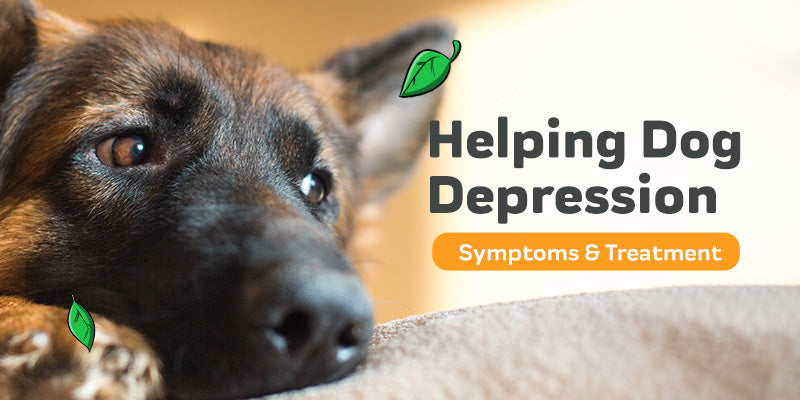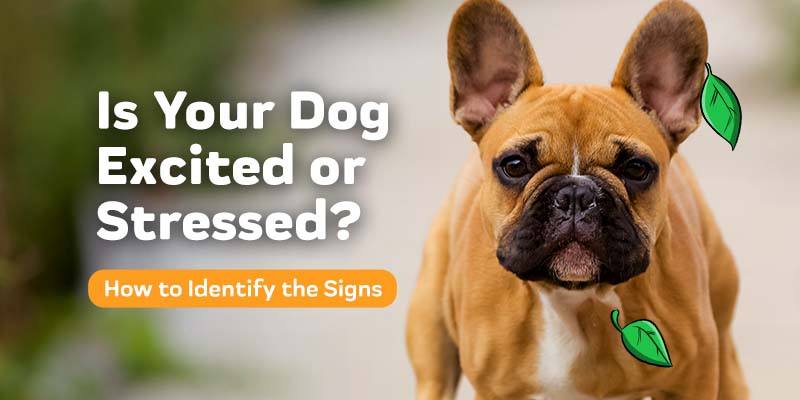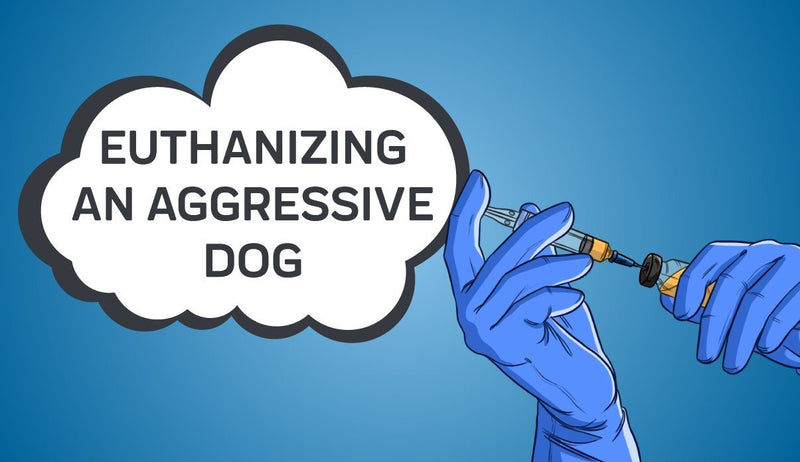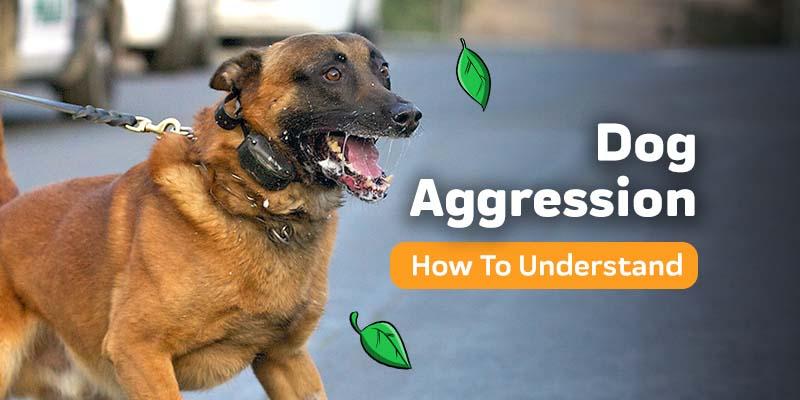- Causes of Depression in Dogs
- How to Know if My Dog is Depressed
- Dog Depression Symptoms and Signs
- What Should I Do If My Dog is Depressed?
- What Can I Give My Dog For Depression?
A common question among pet owners is, "Is my dog depressed?" Just like you and me, our canine companions are unfortunately susceptible to health disorders, both mentally and physically. One of the most common mental illnesses that people face is depression, and the same is true for dogs. Dogs can get depressed.
Even though dogs cannot outwardly state that they are feeling depressed, there are many signs to look out for, as well as symptoms that will signify depression as the probable cause behind your dog's behavior.
We'll talk more in-depth about the warning signs of depression in dogs later on in this article, but for now, let's explore some of the possible causes behind your dog's depression symptoms. Keep in mind that all dogs are different, and the reasons we list are a general overview of the most common causes behind canine depression.
Your dog's situation might be different from someone else's, and maybe none of these suggestions apply to your pet's circumstances. If you suspect your dog might be depressed even though the following scenarios aren't relevant to your dog, be sure to contact your dog's vet immediately to set up an appointment.

Causes of Depression in Dogs
One of the trickiest parts of depression is that the illness is not a physical illness. As a mental illness, depression is the outcome of a chemical imbalance, which you cannot see your dog's symptoms with the naked eye.
However, it's still possible to connect the dots on the symptoms and figure out that your dog might be battling a case of depression. This is especially true when you have an idea of the potential causes that result in canine depression.

Some of the most common Potential causes of depression in dogs include:
- Sudden Changes in Living Arrangements
- A major life change
- Phobia-Oriented Fear
- Like Dog Owner, Like Dog
- Heartbreak and Loss
- A Side Effect of Physical Ailments
- Environmental changes
How to Know if My Dog is Depressed
The ultimate way of knowing that your dog has depression is to seek a diagnosis from a skilled and experienced professional who knows precisely what depression looks like in dogs. However, your dog's veterinarian only sees your pup for a brief time during their appointment, and you see your dog on an everyday basis.
Looking out for the signs and symptoms of dog depression is ultimately the best way of knowing if your dog might be depressed. When you have an idea of what dog depression looks like, you can spot the warning signs that indicate your dog's mood and if they might be struggling with depression. Let's take a closer look at the symptoms of depression.
Dog Depression Symptoms and Signs
The most apparent sign of dog depression is a typically excitable and energetic dog becoming incredibly withdrawn. When dogs start isolating themselves and preferring to sleep rather than play, it may be a sign that your dog is depressed. When the self-isolation is paired with inactivity, most dogs are experiencing the physical manifestations of depression.

Laying low is not only defined by just sitting down all day but instead, it's depicted by sleeping more often than usual. If your dog spends more time asleep than awake, this might also be indicative of depression in dogs. Sleeping habits and activity levels are almost always affected by depression.
When dogs sleep more frequently and move around less often, their appetites tend to fade away, leading them to eat far less than they used to. If your dog is showing signs of reduced appetite, you might also come to realize that your dog eats far less food, resulting in rapid weight loss as a side effect of dog depression.
At the same time, not every dog exhibits a decrease in overall food consumption when depression enters the picture. Just like a high percentage of people with depression, a depressed dog might experience an uptick in their appetite, resulting in weight gain. The point to take home is the fact that if your dog suddenly gains weight or has severe weight loss these are both signs of dogs with depression and/or mood disorders.
Anxiety is another side effect of depression. Sometimes, the separation anxiety coincides with the addition of another new pet in your household. It doesn't always stem from inviting another pet into your life but still, sometimes, another pet will cause your dog to feel left out or less important, leading to chronic stress and more isolation-oriented behavior.
What Should I Do If My Dog is Depressed?
Depressed dogs need extra attention and affection to carry them through their depressive episodes. Depressed dogs are enduring a mental disorder that often manifests as physical side effects, but there are still many ways to help your pet feel like a happy dog, despite the cognitive-based disorder.
Has your dog always loved car rides? If so, plan to take your pet on long car rides to help them feel a sense of normalcy. Maybe your dog is an avid fan of the dog park, or they have a friend that they always loved playing with at the park. Even if your pet would rather sleep all day, try to get them outside for a change of scenery. Reward based training methods can help them get into a rhythm of being happy and condition them out of the negative sad dog loop.

If possible, it might even be helpful for your dog to always be around a family member. Dogs are such family-oriented pets, that even if your dogs seem like they don't want to be around anybody, the company of a family member can not only be soothing but calming as well. Dogs become our family members and they become very attached to their humans, when they are feeling sad and experience depression, they do not understand what is going on. They need us to be around and care for them. We need to notice signs when our dog is depressed and make sure we are there for them to feel love by giving them quality time.
Pay attention to your dog's sleeping habits, weight gain, or other health issues that might arise amid depression. The most important thing you can do is be as proactive as possible. Don't let the signs of depression go unnoticed. The sooner you catch onto the side effects of depression in dogs, the faster your vet can intervene and let you know if more serious steps need to be taken.
What Can I Give My Dog For Depression?
All pet parents can agree that their number one goal for dog depression is to alleviate the unfortunate symptoms as much as possible. Since dog depression results from a chemical imbalance in the brain, it's challenging to get rid of the dog depression itself. However, that doesn't mean you can't help your canine companion feel like a happy dog again.
Did you know that CBD can offer excellent benefits to dogs with depression? CBD has been used by people with mental health disorders for years now, and with more research backing the effects of CBD on dogs, it has been adopted as a beneficial addition to the lives of dogs with depression as well.
CBD not only helps with low moods, but it also helps with any situations where comorbidity is at play, too. For example, if your dog has anxiety alongside their depression, CBD can assist your dog with the management of anxiety-related symptoms as well. From relieving physical pain, slowing down any fast-paced thoughts, and calming manifestations of an anxious mindset, CBD truly benefits dogs with anxiety and depression.
If you're curious about other benefits that CBD offers to dogs with depression, take a look at Innovet's CBD oil for dogs. You'd be amazed by the many other relieving properties. CBD provides when added to your dog's life as a daily supplement. Trust us when we say your dog will thank you for introducing them to CBD for dogs!
Sources:
Depression in DogsCan Dogs Get Depressed?

















